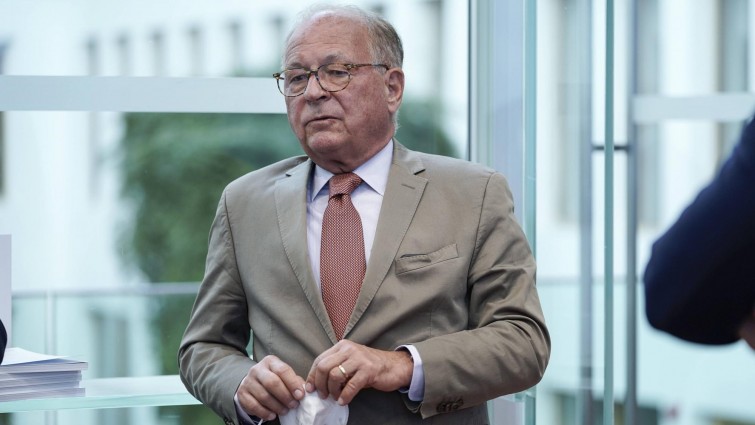Ischinger complained that foreign policy was given too little importance in the election campaign and in previous explorations at the federal level. Ischinger noted that many of the earlier certainties of foreign policy have been shaken: the basic assumptions that the United States will be available as a protective power at all times and that the internal unity of the European Union is advancing no longer hold. “We are very concerned because we believe this may significantly underestimate the challenges that the next federal government and the new parliament will face.”
(DPA/Image Alliance/Florian Gartner)EU foreign policy – Germany must learn to think about geopolitics again
In the complex geopolitical situation, the new federal government will play a major role. Berlin must mediate between its western and eastern neighbours. Moritz Koch comments that Germany needs a new understanding of what foreign policy should achieve.
Ischinger said one can no longer take for granted that Russia will develop into a strategic partner and that China will become more Western through trade.
The full interview:
Munchenberg: Mr. Ischinger, your impression: Are security issues currently underestimated?
ischinger: I certainly think so, you said it yourself, Mr. Münchenberg, there was not much to be seen on the campaign trail. We, the Munich Security Conference, attempted to organize a television experiment among the three candidates for the position of chancellor at the start of the election campaign in July. In the following manifestations, foreign, security, defense and development policy have played a neglected role at best. We are very concerned because we believe this could significantly underestimate the challenges that the next federal government and, of course, the new parliament will face. Let me just write a couple of lines here: Almost all the basic certainties that we thought underpin German foreign policy since the last reunification have faltered or are already a thing of the past. The belief that the United States will forever protect us from injustice, the belief that the European Union is on a steady path to ever greater unity and integration, and the belief that Russia can be a strategic partner with whom we can achieve lasting security. It is in Europe that China will gradually become Westernized through change, so to speak, through trade – all of these supposed basic assumptions of security policy are no longer valid today. That is why Germany faces very big challenges.
Security politicians agree across parties
Munchenberg: May I comment that for a moment: I have already mentioned a lot of topics, so I wanted to come back to them again, perhaps again in principle: there is this, yes, I will say a kind of workshop for those old and new who are interested in members of the Bundestag. Your impression so far: How big are the similarities, especially the SPD, the Greens, and the FDP? There are completely different ideas when it comes to, for example, armed drones, acquiring armed drones and the 2% defense spending target, financial deployment and so on. So you already have some sort of impression that somehow it’s going to be very difficult to understand yourself here?
ischinger: To be honest, here I am – and I am very happy with that personally – not as pessimistic as you are about to describe it. My impression is, I want to put it this way, if the security politicians are reasonable, regardless of whether they belong to the SPD or the CSU or the Greens, when they speak, and not now in the plenum of the German parliament, where there is about the general impression is that when they talk to each other, so to speak in the conference venue we present to them yesterday and today, the differences are not that dramatic. Then they talked to each other about the best way to do it, and that actually makes me feel more positive. The question is, of course, whether these rational foreign and security policy experts can win, because of course there are partisan decisions and fundamental questions. But with this discussion, we just want to try a little to create rapprochement, raise awareness of the problem a little, and hopefully also make the decision, because Germany is facing very big decisions.
Does Europe have a Plan B?
Munchenberg: We come to that now. You mentioned the United States of America, the transatlantic relationship, which made a comeback with Joe Biden. Looking at the unilateral withdrawal to Afghanistan or the dispute over the submarine deal with Australia, the question is: How reliable is the old partner really?
ischinger: In the two or three months before us, we’ll certainly be able to work well with the Biden administration, because it basically claims to focus on alliances and partners, though, how should one say, traffic accidents what happened there, key words in Afghanistan, A keyword for French humiliation in the Pacific and so on. But Mr. Münchenberg, the question behind it is a troubling one. For the first time in living memory, I would say, since Adenauer, we have the question before us, we have to think about who will be the next US president. This question first arose with Donald Trump, and now we have to ask ourselves the question, whether we have an obligation in our own interest to think about how we can prevent another one in the United States in 2024 – it doesn’t necessarily have to be Trump himself – can we Someone elects a president again who leaves Europe to its own devices, no longer cares about it, no longer obligated. so what? Do we have an alternative plan for this? These are questions that should at least be considered seriously.
“We must try to establish a strategy between the European Union and China”
Munchenberg: Well, Mr. Ischinger, the United States is also putting increasing pressure on China. The former chancellor, Angela Merkel, has always refused to agree to this. Can you still hold out?
ischinger: We will certainly encounter great difficulties if we think we can determine some kind of smooth compromise. Of course, in my opinion at least, an attempt must be made here to achieve intense Western transatlantic coordination on the issue of China. The first point. So we are on the side of the West and we want to come to terms with the United States on the right path to go to China. The first point. Point two: But this will only have a chance of success, both in Washington and in Beijing, if we, the European Union, speak with one voice. Well, there can be no German policy toward China, and French policy toward China, and then of course there was British policy toward China and so on. It is not a recipe for success. We should try to develop a strategy between the EU and China.

Bettina Klein commented that the precipitous withdrawal from Afghanistan demonstrated the importance of a common European foreign and security policy. But this requires strategic and political will.
Munchenberg: But now you have to say, Mr. Ischinger, in order to connect it, the European Union is an economic giant, but rather a dwarf in terms of foreign policy, and it is precisely this principle of consensus in foreign policy that prevents progress on this. Area. So the question is, you’re asking about it, but is that realistic?
ischinger: Well, now it is not only about, fortunately, foreign policy decisions that, according to the established rules, as I rightly said, must be taken unanimously. It’s also about things like investment rules, for example. It’s about piracy, it’s about – “intellectual property” is the technical term. It’s about investment rules, it’s about fair trade, it’s about climate policy and so on. Those are the areas where the European Union faces challenges and must, and hopefully, be able to agree on a line here. It’s also clear to me that in foreign policy there will be a long way to move away from the rule of consensus. Incidentally, I am of the opinion, like many in the federal government and also many MPs old and new, that it must be a German task to work toward the abolition of the consensus rule, or else we will not be. The world is taken very seriously.
The statements of our interlocutors reflect their views. Deutschlandfunk does not take statements made by its interlocutors in interviews and discussions as its own.

“Award-winning music trailblazer. Gamer. Lifelong alcohol enthusiast. Thinker. Passionate analyst.”






More Stories
Address to the Nation: Joe Biden Explains His Resignation and Future
Harry makes serious claims in TV documentary: Will Meghan never return to UK?
’90s TV Star: Mourning Brenda: American Actress Shannen Doherty Dies – Entertainment